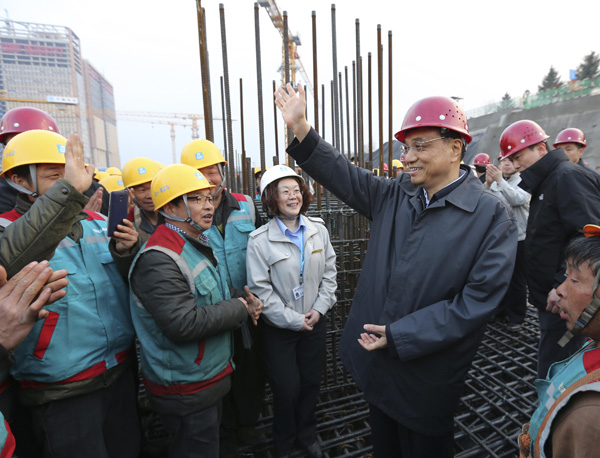Li encourages a positive outlook
By Zhao Yinan (China Daily) Updated: 2015-04-10 03:10
 |
|
Premier Li Keqiang talks to workers on Thursday at a transportation hub being built in Changchun, Jilin province. DINGLIN/ XINHUA |
Premier takes fact-finding trip to drum up confidence about country's economic track
With a cold snap sweeping across most parts of China — as well as its economy — Premier Li Keqiang traveled on Thursday to the country's northeastern rust belt to offer reassurance and drum up confidence.
In his first fact-finding trip after annoucing the slowest annual growth since the financial crisis, around 7 percent, Li visited an urban rail construction site after his arrival in Changchun, the capital of Jilin province known for its heavy industries, such as automobile and rail manufacturing.
Li emphasized the important role of investment in driving up the economy, as he stood atop a platform at the site of the city's largest ongoing infrastructure project, which involves a total investment of more than 370 million yuan ($59.6 million).
"Urban infrastructure construction is the inner strength of a city, which improves its external beauty," Li said.
Jilin's traditional heavy industries have been badly hit by the country's drive to restructure the economy. The provincial government set the outlook for economic growth at about 6.5 percent this year, fourth from the bottom nationally.
Thursday's tour also took Li to the country's largest wire harness manufacturing company, which was transformed from a State-owned bulb factory in 1999. The labor-intensive work of supplying wire harnesses for automobiles relies on more than 7,500 workers, more than 80 percent of whom come from nearby communities.
Li Hongbo, 18, is a streamline assembler, securing wires to automobile engines with rubber tape. He secures about 300 bunches of wires every day, or one every five minutes. He said he is content with his job, although his hands sometimes hurt.
"I hope I can become the team leader, if I work hard enough — and that I can find a girlfriend," he said.
Li's visit came a week before the country is to announce what is expected to be its slowest quarterly growth since 2009.
A government-backed think tank made an earlier prediction that China's GDP in the first quarter will fall to 6.85 percent, presenting the "most challenging" economic environment since the global financial crisis.
Zhao Zhenhua, an economist at the Party School of the CPC Central Committee, argued that despite the fact the country is facing the most challenging international economic environment since 2009, China has plenty of room to deal with downward economic pressure in the second quarter, including reserve requirement ratio cuts for banks and infrastructure spending.
Last month, China said it would allow the biggest budget deficit since the financial crisis to support spending this year. In addition, local governments will swap 1 trillion yuan in maturing, high-interest local debt for new official municipal or provincial bonds to help ease the repayment burden.
- Govt encourages people to work 4.5 days a week
- Action to be taken as HIV cases among students rise
- Debate grows over reproductive rights
- Country's first bishop ordained in 3 years
- China builds Tibetan Buddhism academy in Chengdu
- Authorities require reporting of HIV infections at schools
- Typhoon Soudelor kills 14 in East China
- Police crack down on overseas gambling site
- Debate over death penalty for child traffickers goes on
- Beijing to tighten mail security for war anniversary







